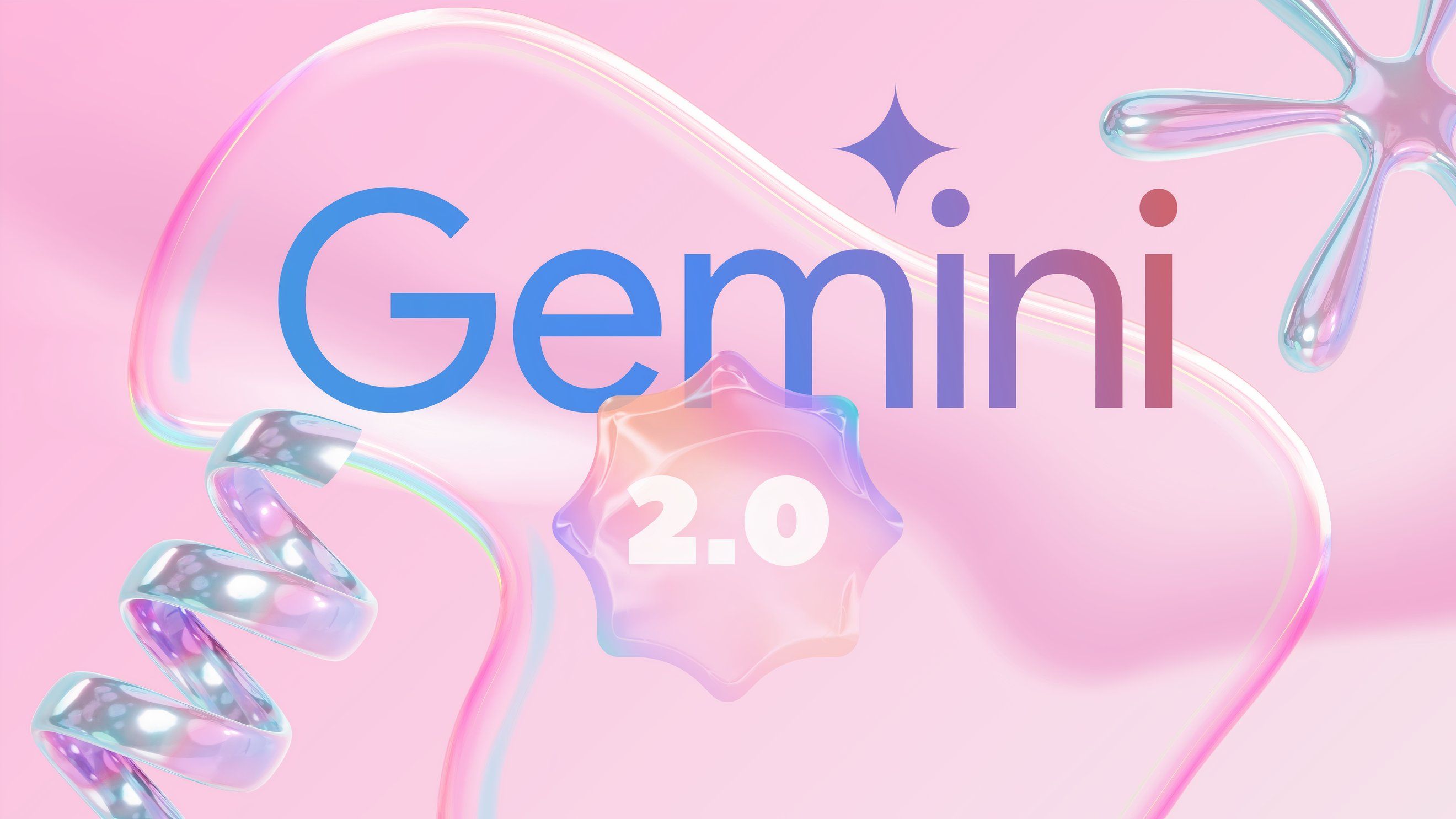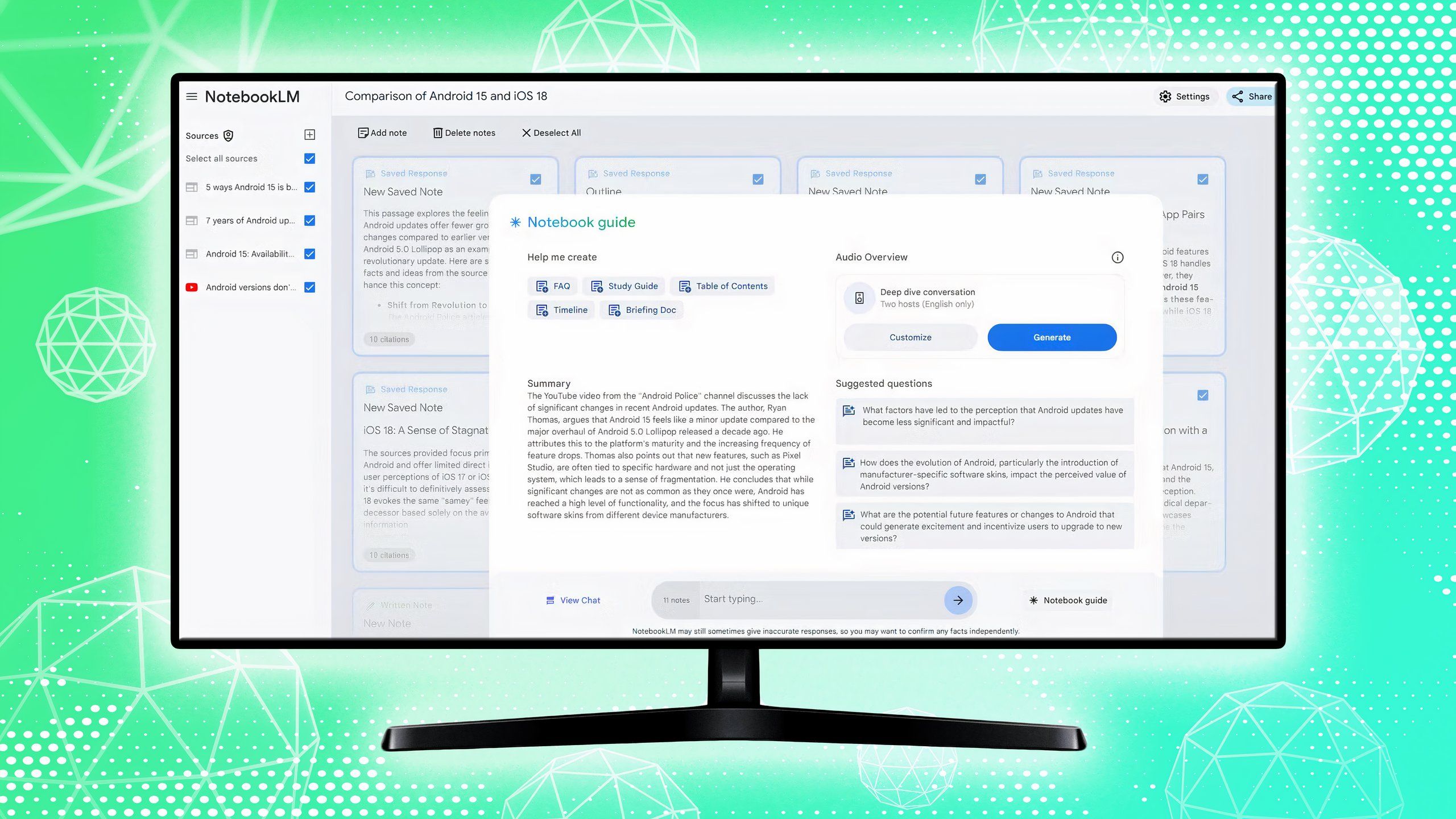The LLM landscape is dominated by a handful of key players, with OpenAI, Google, Microsoft, Meta, and Anthropic estimated to command around 90% of the market. While partnerships and limited data make the market somewhat difficult to measure, OpenAI is the leader, followed by Google. That’s not surprising, given that OpenAI had almost a one-year first-mover advantage over Google. ChatGPT launched as a viable solution in November 2022, compared to Bard’s slower evolution into the fully-baked Gemini, which debuted almost a year later. Even so, Google’s AI is ubiquitous, extending beyond the web into the best Android smartphones.
Functionally, OpenAI and Google are neck and neck. While Chat-GPT is stronger with AI visuals, Google has its wins with solutions such as NotebookLM. Here’s why I believe Google is poised to dominate the AI arms race in the years ahead. Let’s dive in.
5 Google has broad strength on many fronts
Google’s strength comes from a combination of factors: a long-term track record of successful research and development, a robust financial foundation that allows sustained investment, and an existing dominance in key areas such as search and Workspace. AI startups are at the mercy of venture funding, while Google has the resources to pursue ambitious research and development initiatives regardless of which way the wind blows.
While Google faces regulatory challenges because of its breadth, OpenAI also has structural issues because it was founded as a non-profit that is now a de facto satellite of Microsoft.
AI is one of the most profound things we’re working on as humanity. It’s more profound than fire or electricity.
— Sundar Pichai, CEO of Google and Alphabet
Over the years, Google has pulled off what most companies can’t. Despite growing from a startup into a behemoth, it has not lost its ability to innovate. It generally builds, not buys, as seen in its AI solutions, from software like Gemini to hardware such as its Tensor smartphone chips. This contrasts with Microsoft’s reliance on its partnership with OpenAI, which limits its long-term flexibility.
4 Google’s products are super sticky
It’s not only about having money and making cool stuff in-house. Google’s products are deeply woven into our daily lives. With around 90% of the global market share translating to billions of daily searches, Google dwarfs competitors like Bing, which barely registers with 3% of searches. People tend to stick with their chosen search engine, and search is a gateway to everything else. This stickiness extends to Google Workspace, with over 3 billion users surpassing Microsoft’s 1.2 billion.
While Amazon focuses its AI efforts on e-commerce and Facebook on social networking, neither has the same breadth of data across search, productivity, and mobile operating systems. Google’s expansive view of user behavior and its massive scale provide a solid perch from which it can dominate AI going forward.
3 Agentic AI is Google’s baby
Google is poised to lead in the “agentic era” of AI, a term coined by Google to describe AI’s evolution from prediction to action. This means AI agents will go beyond analyzing data to making decisions and interacting with the world. Google’s early embrace of this concept positions it at the forefront of the current wave of AI innovation, giving it more leverage to pull ahead of competitors.
Google’s advantage in the agentic era comes from several factors. Its massive data repositories, gathered from billions of users across Search, Workspace, and Android, provide the fuel for training highly capable AI agents. Its expertise in developing AI infrastructure, like TensorFlow and TPUs, enables efficient deployment and scaling of these agents. Its deep integration with existing products and services provides a natural entry point for agentic AI.
2 Search data is Google’s superpower
Google’s unparalleled access to search data provides an almost insurmountable advantage. The company gathers an immense amount of information about human language, intent, and information consumption. This data captures how people ask questions, the information they value, and how they interact with search results.
This gives Google an advantage in developing AI models that can understand complex queries, discern user intent, and generate relevant responses. This data can also be used to train AI agents that perform tasks, answer questions, and anticipate user needs. In other words, its vast troves of search data are a significant moat for Google.
1 No other ecosystem can touch Google’s depth
Google’s strength in the AI race is bolstered by its ownership of the entire technology stack. Its ecosystem provides a seamless experience for users, from personal devices to enterprise solutions. The synergy between Android and Google Workspace allows Google to tailor its AI applications to a range of user needs. Free services like Search, Gmail, and Maps draw users into the ecosystem.
This integrated approach extends to Google’s investments in hardware. By designing its own Pixel phones and developing custom AI chips, such as Tensors, Google has greater control and visibility into the entire user experience. It would be difficult for others to achieve the same level of integration and capabilities between hardware and software optimized for AI.
Challenges and the road ahead
Google faces some real challenges. Concerns around data privacy and biases in its algorithms create an opening for competitors. While a benefit, its vast size could impede agility. The potential for antitrust scrutiny and regulatory snarls could also limit Google’s ability to leverage its data.
The competitive landscape is evolving. New players with innovative approaches could challenge Google’s dominance, especially in specific domains. Maintaining its leading position will require Google to address privacy concerns and adapt to ever-shifting regulatory environments.
Google’s vast data, comprehensive ecosystem, commitment to R&D, and early leadership in the agentic era position it as a dominant force in the AI landscape.
While competitors will continue to thrive, Google’s strategic advantages and steady focus on AI innovation give it an edge on the leaderboard. As AI continues to reshape many aspects of productivity and content, Google’s influence will only grow. This will solidify its position as a leader in the AI race for the foreseeable future.










